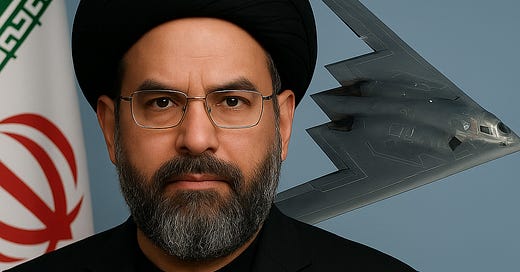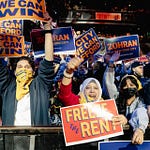"Cur ante tubam tremor occupat artus?" Virgil (Aeneid, Book XI, 424)
The leaked Defense Intelligence Agency assessment that questioned the effectiveness of Donald Trump's strikes on Iranian nuclear facilities may have been based on faulty intelligence, specifically intercepted communications in which Iranian officials deliberately downplayed damage to their own leadership.
According to former intelligence officers and current U.S. officials who spoke to the Washington Free Beacon, the classified DIA report that made headlines when it leaked to CNN likely fell victim to Iranian disinformation, raising serious questions about both the credibility of the assessment and the decision to leak it.
The Assessment Under Fire
The DIA report, which cast doubt on the success of Trump's January strikes on Iran's nuclear program, has come under intense scrutiny from intelligence veterans who note several red flags. Most significantly, the assessment was marked "low-confidence," a crucial qualification that CNN omitted from its original reporting.
"It's basically messaging by the [Islamic Revolutionary Guard Corps], messaging by Tehran," said Michael Pregent, a former intelligence officer with U.S. Central Command who operated in the Middle East for nearly 30 years. "DIA is taking a SIGINT report from the National Security Agency … and putting together an assessment to leak."
The timing of revelations about Iranian deception adds weight to these criticisms. One day after the DIA assessment leaked, Axios reported that an Israeli official revealed "intercepted communications suggest Iranian military officials have been giving false situation reports to the country's political leadership downplaying the extent of the damage.
The DIA's Dubious Distinction
Former intelligence officials weren't shy about their assessment of the Defense Intelligence Agency's capabilities, with some referring to it as the "discount intelligence agency." This institutional skepticism reflects broader concerns about how intelligence is collected, analyzed, and disseminated across different agencies.
The reliance on signals intelligence (SIGINT) from the National Security Agency appears to be at the heart of the problem. If Iranian officials were deliberately providing false information in communications they knew might be intercepted, any assessment based on that intelligence would be fundamentally flawed.
"I know it's messaging, the Iranians know it's messaging, and for some reason, NSA believes it's actual f—ing intelligence," Pregent said, highlighting the frustration among intelligence professionals about the apparent failure to recognize deceptive communications.
The Broader Intelligence Picture
The incident raises uncomfortable questions about intelligence collection and analysis in an era when adversaries are increasingly sophisticated about manipulating information flows. Iran has demonstrated particular skill at information warfare, using everything from proxy networks to direct disinformation campaigns to shape international perceptions.
The fact that Iranian military officials were reportedly providing false damage assessments to their own political leadership suggests a deliberate strategy to minimize the apparent impact of Trump's strikes. This internal deception campaign may have been designed precisely to influence U.S. intelligence assessments and, by extension, American policy decisions.
Georgetown's Qatari Connection
Meanwhile, a separate investigation reveals how foreign influence operates through different channels entirely. A new report from the Institute for the Study of Global Antisemitism and Policy exposes the extent of Qatari influence at Georgetown University, particularly through the school's lucrative relationship with the Gulf state.
Georgetown's Doha campus, established in 2005 through a multimillion-dollar arrangement with the Qatar Foundation, gives Qataris significant control over an institution that trains America's future diplomats. The Qatar Foundation, a state-run nonprofit, has been identified as a key vehicle for Doha's influence operations in American higher education.
The financial relationship extends well beyond the campus itself. Qatari money has supported Georgetown's Prince Alwaleed Bin Talal Center for Muslim-Christian Understanding, which has "longstanding ties to pro-Islamist and anti-Zionist entities," including groups founded by the Muslim Brotherhood.
This matters because Georgetown's School of Foreign Service is a primary pipeline for future State Department officials and diplomats. The influence of Qatari funding on curriculum, faculty hiring, and institutional priorities could shape the worldview of America's next generation of foreign policy professionals.
The Strike Authorization Framework
As these intelligence and influence questions swirl, the Biden administration continues to signal readiness for additional military action if Iran restarts its nuclear program. Israeli Defense Minister Israel Katz recently briefed lawmakers that the United States and Israel are jointly monitoring Iranian nuclear activities and are prepared to strike again if necessary.
White House Press Secretary Karoline Leavitt confirmed this posture while emphasizing the administration's preference for diplomatic solutions: "The president wants peace. He always has," she said, while noting that Trump "is not afraid to use strength if we need to do it."
This framework of diplomatic engagement backed by credible military threats requires accurate intelligence to function effectively. The apparent failure of the DIA assessment to account for Iranian deception undermines confidence in the intelligence community's ability to provide policymakers with reliable information about Iranian capabilities and intentions
Implications for Intelligence Reform
The leaked DIA report scandal highlights several systemic problems within the U.S. intelligence community. First, the apparent inability to recognize and account for adversary deception in intercepted communications suggests analytical failures that could have far-reaching consequences.
Second, the decision to leak a "low-confidence" assessment raises questions about both security protocols and the motivations of those with access to classified information. The omission of the confidence level from initial media reports suggests either journalistic failure or deliberate manipulation of public perception.
Finally, the incident underscores the need for better integration between different intelligence agencies and improved methods for validating information from hostile sources. As adversaries become more sophisticated in their deception techniques, American intelligence collection and analysis must evolve accordingly
Looking Forward
The twin revelations about flawed intelligence assessment and foreign influence operations at elite universities highlight the multifaceted nature of contemporary threats to American national security. While military strikes and diplomatic negotiations capture headlines, the quieter work of information warfare and institutional influence may prove equally consequential.
For policymakers relying on intelligence assessments to make life-and-death decisions about military action, the DIA incident serves as a stark reminder that even classified information must be viewed with healthy skepticism. As one former intelligence officer noted, the Iranians know they're sending messages—the question is whether American analysts are sophisticated enough to recognize them as such.
The stakes of getting this right extend far beyond any single military operation. In an era of great power competition, the ability to distinguish between genuine intelligence and sophisticated deception may determine the success or failure of American foreign policy across multiple theaters and adversaries.
The Zohran Mamdani Mirage: How NYC Fell for a Marketing Masterpiece
I was scrolling mindlessly through TikTok, thumb moving with the practiced precision of someone who's replaced real human connection with dopamine hits from strangers, when it happened again: another Zohran Mamdani video stormed my FYP. This time, our socialist savior was diving into the East River in a white button-down, emerging like some dripping wet Marxist messiah to declare he'd "drown rent increases for good."


















Share this post